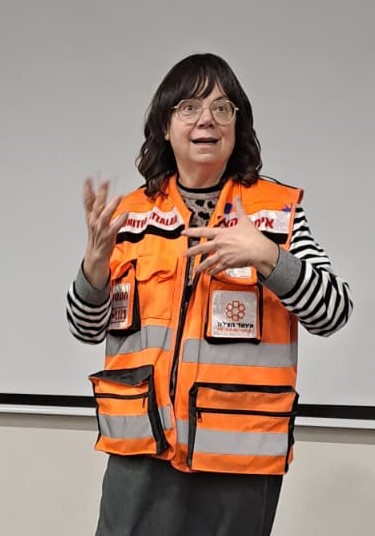Darkei-Sara High School students enjoyed a unique three-day program in December, exploring their involvement in Israeli society.
The “Masa Ma’agalim” program was designed by Darkei-Sara principal, Hadas Neiman. “Our goal was to take our Year 11 and 12 students on a journey around Israel to investigate their identity, to interact with wider Israel society, and learn about the idea of personal responsibility. We explored the four circles (ma’agilim) in which we each exist and interact: family, community, Israeli society, and the Jewish World. “We are helping our students to build their authentic female Charedi identity, by thinking about their future role in the world.”
On the first day, the students davened Shacharit at the Kever of Shmuel HaNavi and learned about his sense of responsibility and self-sacrifice for the sake of the Jewish people. They visited people with disabilities living and working in Kfar Tikvah, and learned how service dogs are trained to help people with physical and psychological challenges. In Tzfat, they met with a teacher of Breslov Chassidut to learn about self-reflection, and how to use our inner strengths to survive in the world. The next speaker was a mother who spoke about adopting and bringing up children with disabilities, and how to exceed your own limitations in order to give to others.

The second day was dedicated to exploring Charedi identity and community values. They met a woman who became religious and spoke to them about her constant search for values and her attempts to bridge the gaps in Israeli society. They volunteered in a Shuvu school that is supporting recent immigrants from the war-torn Ukraine. They arrived with nothing and have received both physical support and religious enrichment from the school community. The girls walked together blindfolded along the suspended bridges at Park Nesher to experience the feeling of entrusting your life to the support of other people.
The students met with Rav Shmuel Eliyahu, the Chief Rabbi of Tzfat, who spoke to them about the power of the people of Israel, and the dangers that we face when this power is not based on Torah values. He emphasized the responsibility incumbent on young women in the coming decades; to hold the balance between the changes taking place in the world and our traditional values.

On the third day of the journey, the girls were encouraged to think about turning challenges into initiatives. They met a mother whose child drowned and who now distributes gifts to children in hospital. They discussed the challenges of ageing and the importance of supporting elderly relatives and those in the wider community who are struggling.
They visited the city of Lod, to learn about its history and to meet religious women who live in this largely-secular and mixed Arab-Jewish city, where ugly race riots erupted last year. The women explained their commitment to keep the Lod Jewish community alive despite the difficulties. The final stop on their journey took them to the offices of Ichud Hatzalah, to meet a woman who volunteers for this Charedi emergency support service, and to hear why it was important to create a women’s volunteer corps.
The Masa Ma’agalim journey was accompanied with a reflection journal that encouraged each girl to think about the places and people that they encountered, and what they took away from each experience. They also received letters written by their parents, and drafted their own letters expressing their thoughts and aspirations.
Uniquely for a program in a Charedi school, the students were encouraged to understand the world outside of their own ‘bubble’, and how they can make a difference by involving themselves in these different circles while maintaining and clarifying their Charedi identity. They were all inspired by the examples of altruism that they saw all over Israel, and particularly the diverse projects run by religious women.
Hadas Neiman explains: “All teenagers see themselves at the center of their own world, but we want to show our students how many different circles actually exist around them. Our goal is to empower them to make positive choices for the future to take responsibility, to initiate, and to make the most of all their potential opportunities.”

